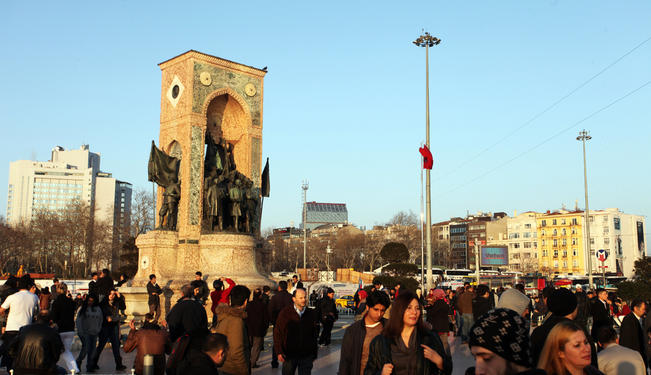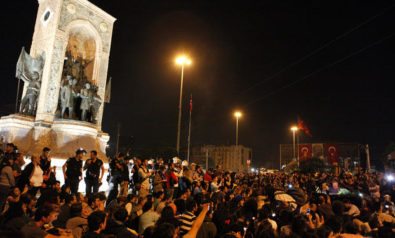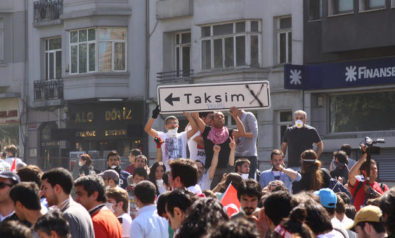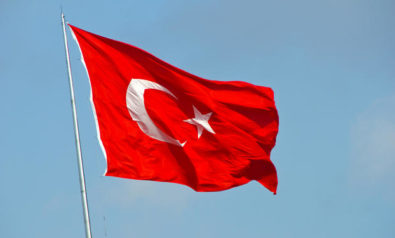Comparisons between Taksim and Cairo’s Tahrir Square are tempting. The protests in Turkey constitute a warning that maintenance of Erdogan’s style of government could turn Taksim into Tahrir.
Almost a week of countrywide protests in Turkey have left an indelible mark on the country’s political landscape. Broad discontent with Prime Minister Recep Tayyip Erdogan’s policies and increasing haughtiness bubbled to the surface; thousands of united militant soccer fans joined the Taksim Square protests and were politicized; and the role of the police has solidified opposition groups.
Erdogan’s intransigence and hard-handed police attempts to suppress protests with tear gas and water cannons swelled the ranks of the demonstrators, and turned a demand for perseverance of a 75-year-old Istanbul park into a massive call for the prime minister’s resignation. Thousands of militant fans of Istanbul’s three rival soccer clubs, led by the left-wing – the most politicized of the support groups being Carsi, the ultras of Besiktas JK – joined forces for the first time in 30 years, as they marched to Taksim Square. So too did rival soccer fans in other cities.
Taksim: The Next Tahrir?
Comparisons between Taksim and Cairo’s Tahrir Square, that has come to symbolize the ability of the street to topple a government, are tempting. To be sure, there are superficial similarities but these are outstripped by the differences. The two squares share the unification of rival soccer fans with a history of fighting one another; the occupation of a main city square; the protesters’ slogan: "Erdogan, istifa" (resign), in imitation of Egypt’s "Mubarak irhal" (Mubarak leave); the violent police crackdown; and the ultimate, at least partial, government backdown.
But unlike mass demonstrations that toppled leaders in North Africa, protests in Turkey are against a democratically elected leader who has won three elections with a respectable majority, presided over a period of significant economic growth, and repositioned his country as a regional power with global ambitions. They also occurred, in contrast to Arab countries, in a country that, despite all its warts, is democratic and has a strongly developed, vociferous civil society.
The Taksim protests in the week that Istanbul celebrated its capture by the Ottomans 560 years ago, have sent Erdogan an unambiguous message: discontent with the prime minister’s authoritarian streak; the Turkish government’s support of Sunni Muslim rebels in Syria; increasing government control of large chunks of the media and attempts to stifle independent reporting and commentary; and suspicion is mounting that he is attempting to Islamize public life. The protests constitute a warning that maintenance of his style of government could as yet turn Taksim into Tahrir.
A decision by the diverse, uncoordinated groups, that came together on Taksim, not to occupy the square and build a semi-permanent tent camp to press for their demands – the preservation of the park that is to be replaced by a shopping mall, an apology by the police for its heavy-handed use of force, and the resignation of the Erdogan government – has taken the wind out of the protests. The momentum has temporarily shifted in favor of Erdogan but to retain it, Turks will have to see a real change in his style of governing. Erdogan benefits from the fact that with no soccer league matches scheduled for the foreseeable future, stadiums, a traditional protest venue in a soccer-crazy country, militant soccer fans are deprived of their natural organizing grounds.
Despite this, major questions remain that need to be addressed and answered to prevent soccer fans and thousands of others from returning to Taksim and other city squares across Turkey. Will Erdogan back off his plan to redevelop Taksim that has already led to the shutting down of the square’s historic bakery, Inci Pastanesi, and its iconic Emek Theater? Erdogan responded to this week’s Gezi Park protest by saying the government would push ahead with its plan “no matter what they do.” The prime minister warned that he could put 100 people on the street for every anti-government protester.
For much of the week, events on Taksim and in other Turkish cities were underreported in much of the media in Turkey, which ranks high on the list of media-unfriendly countries, according to the number of incarcerated journalists. In May, the government strengthened its grip on the media with its takeover of financially troubled Cukurova holding television stations and Digiturk pay-tv. The underreporting was allegedly after government phone calls to various media.
Transformation of the Protests
The explosion of discontent allowed secularists, with the opposition Republican People’s Party (CHP) in the lead, to turn the protests into an alleged Islamization of society. Secularists point to this month’s new restriction on the sale and consumption of alcohol and the naming of a third, controversial Istanbul bridge that spans the Bosporus as the Yavuz Sultan Selim or Selim — the Grim Bridge in honor of the Ottoman sultan who was widely blamed for the massacre of Alevis in the early 16th century. Alevis, accounting for an estimated 20% of the population, although distinct from Syrian President Bashar al-Assad’s Alawite community, see Erdogan’s support for Syria’s Sunni Muslim rebels as further disregard of their concerns, and have tapped into widespread popular dislike of the government’s anti-Bashar policy.
An interior ministry investigation into the police crackdown on Taksim ordered by Erdogan will also have to clarify whether the crackdown reflected the split between the prime minister and Fethullah Gulen, who is also opposed to unrestricted Turkish support for the Syrian rebels. Gulen, a powerful, self-exiled, Pennsylvania-based cleric, is believed to wield considerable influence within the police force.
The two men have clashed in the past year over measures to prevent match-fixing after Turkey was rocked by a major match-fixing scandal. Erdogan defeated Gulen’s attempts to ensure harsh penalties, which would have weakened the prime minister’s grip and potentially strengthened the cleric’s influence in Fenerbahce FC, which has a fan base of millions.
“Erdogan is smarter than the Egyptians. He lets people demonstrate. He caters to the rights of the religious and the Kurds to garner votes and ignores the secularists. The fans are largely secular. This week’s demonstrations have shown that one can stand against the government and that soccer fans can work together. Things will settle for a few weeks. But Erdogan is on notice,” said a soccer fan as he marched against the government in Izmir.
James M. Dorsey is a senior fellow at the S. Rajaratnam School of International Studies, director of the University of Würzburg’s Institute of Fan Culture, and the author of The Turbulent World of Middle East Soccer blog.
The views expressed in this article are the author's own and do not necessarily reflect Fair Observer’s editorial policy.
Image: Copyright © Shutterstock. All Rights Reserved
Support Fair Observer
We rely on your support for our independence, diversity and quality.
For more than 10 years, Fair Observer has been free, fair and independent. No billionaire owns us, no advertisers control us. We are a reader-supported nonprofit. Unlike many other publications, we keep our content free for readers regardless of where they live or whether they can afford to pay. We have no paywalls and no ads.
In the post-truth era of fake news, echo chambers and filter bubbles, we publish a plurality of perspectives from around the world. Anyone can publish with us, but everyone goes through a rigorous editorial process. So, you get fact-checked, well-reasoned content instead of noise.
We publish 2,500+ voices from 90+ countries. We also conduct education and training programs
on subjects ranging from digital media and journalism to writing and critical thinking. This
doesn’t come cheap. Servers, editors, trainers and web developers cost
money.
Please consider supporting us on a regular basis as a recurring donor or a
sustaining member.
Will you support FO’s journalism?
We rely on your support for our independence, diversity and quality.









Comment